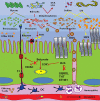Metabolic Influences of Gut Microbiota Dysbiosis on Inflammatory Bowel Disease
- PMID: 34646151
- PMCID: PMC8502967
- DOI: 10.3389/fphys.2021.715506
Metabolic Influences of Gut Microbiota Dysbiosis on Inflammatory Bowel Disease
Abstract
Inflammatory bowel diseases (IBD) are chronic medical disorders characterized by recurrent gastrointestinal inflammation. While the etiology of IBD is still unknown, the pathogenesis of the disease results from perturbations in both gut microbiota and the host immune system. Gut microbiota dysbiosis in IBD is characterized by depleted diversity, reduced abundance of short chain fatty acids (SCFAs) producers and enriched proinflammatory microbes such as adherent/invasive E. coli and H2S producers. This dysbiosis may contribute to the inflammation through affecting either the immune system or a metabolic pathway. The immune responses to gut microbiota in IBD are extensively discussed. In this review, we highlight the main metabolic pathways that regulate the host-microbiota interaction. We also discuss the reported findings indicating that the microbial dysbiosis during IBD has a potential metabolic impact on colonocytes and this may underlie the disease progression. Moreover, we present the host metabolic defectiveness that adds to the impact of symbiont dysbiosis on the disease progression. This will raise the possibility that gut microbiota dysbiosis associated with IBD results in functional perturbations of host-microbiota interactions, and consequently modulates the disease development. Finally, we shed light on the possible therapeutic approaches of IBD through targeting gut microbiome.
Keywords: IBD; SCFAs (short chain fatty acids); dysbiosis; gut microbiota; metabolome.
Copyright © 2021 Sultan, El-Mowafy, Elgaml, Ahmed, Hassan and Mottawea.
Conflict of interest statement
The authors declare that the research was conducted in the absence of any commercial or financial relationships that could be construed as a potential conflict of interest.
Figures


References
-
- Abraham B. P., Quigley E. M. M. (2017). Probiotics in inflammatory bowel disease. Gastroenterol. Clin. North. Am. 46 769–782. - PubMed
Publication types
LinkOut - more resources
Full Text Sources

